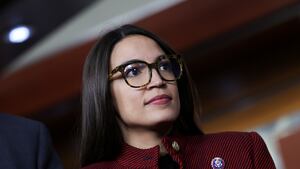Last year’s midterm elections were a tough go for progressive insurgents—with high-profile candidates struggling to oust incumbents, and high-stakes losses from liberal nominees in battleground districts.
The 2024 cycle isn’t looking any easier, as both parties desperately try to seize the House majority—in a presidential election year, no less.
And yet, former progressives candidates from across the country are giving it another shot.
“We knew the first time that I ran in 2020 that we would probably—potentially—have to run multiple times,” said Kina Collins, a progressive organizer in Illinois, who is primarying longtime Rep. Danny Davis (D) for a third time.
“To not just wear the incumbent down,” she continued, “but to really get in front of the electorate and, you know, wake them up that they have options, and choices, and this isn't the best that we can do.”
In 2020, Collins lost the primary by about 46 points. In 2022, she lost by just over 6 points. She said the need for repetition is to be expected. To her, that persistence is part of carrying on the modern progressive movement—which boomed in 2018 and 2020 when a wave of primary challengers unseated longtime incumbents.
Hoping to carry on that momentum, other candidates are following the same idea.
Jamie McLeod Skinner, an attorney and engineer, was the lone progressive to unseat an incumbent House Democrat in 2022. She beat moderate Democratic Rep. Kurt Schrader (D-OR) in a testy primary that drew national attention. Schrader argued he was a better fit for the swing-seat district, which Republicans were heavily targeting.
McLeod Skinner lost the 2022 general election by 2 points to now-Rep. Lori Chavez-DeRemer (R-OR). This year, McLeod Skinner didn’t waste time hopping in again, announcing her second bid in July.
“She’s built a strong grassroots base of support in the district and came incredibly close last year,” a McLeod Skinner spokesperson said in a statement, adding that “with a strong team and energized base, she raised $100k in the first 24-hours of her launch.”
In Texas, Michelle Vallejo won a closely watched open primary while running as a progressive in 2022. She’d won a slew of progressive endorsements. But in the general, she was pitted in a battleground contest against now-Rep. Monica De La Cruz (R-TX). Vallejo lost by 9 points.
Vallejo re-launched in May this year, telling The Daily Beast there’s “a very clear path to victory here.”
“We were able to show impressive gains last cycle in our short fight against Monica De La Cruz. And now we have more time, more support,” Vallejo said.
In New York, progressive former Rep. Mondaire Jones is also running for Congress again after a chaotic redistricting shuffle left him in a crowded primary that he ultimately lost. And Lucas Kunce, a Missouri progressive and populist who lost the Democratic nomination for Senate last cycle, has also mounted another Senate bid.
Call 2024 the year of the rematch—at least when it comes to progressives taking on incumbents they’ve already gone after before.
There’s a logic in going another round; candidates from both parties have done it. You start off with name recognition. You have less of a learning curve on campaigning and electoral strategy. And if you’re lucky, you’re just trying to close in on a few more percentage points to get to victory.
But there are also trickier parts of being a comeback candidate. Voters get fatigued. Convincing holdouts also isn’t an easy task. And if you were the previous nominee—especially in a battleground district—you’re tasked with persuading voters that, even though you lost last time, this time could be different.
Other progressives are considering joining the trend of mounting comeback bids—though some have reservations about the electoral climate, the stakes of 2024, or their viability after 2022 redistricting dramatically shifted the playing field in many states.
Odessa Kelly, a Tennessee progressive who was backed by the campaign group Justice Democrats last year, told The Daily Beast she’s considering another run. She originally mounted a challenge to then-Rep. Jim Cooper (D) in 2022. After redistricting gave Republicans the strong advantage, she ran against Rep. Mark Green (R) instead in a neighboring district. She lost in the general election.
“The issue is trying to figure out a realistic path to victory given how ridiculous the gerrymandering was and how hard they made it for Nashville to have any congressional representation that is actually a resident of Nashville,” Kelly said.
Morgan Harper, a progressive who challenged Rep. Joyce Beatty (D-OH) in 2020 and ran for Ohio’s open Senate seat in 2022, said she’s “definitely still open to running again” in 2024, but doesn’t have any specific plans at the moment. Former state Sen. Nina Turner (D-OH)—who’s twice battled Rep. Shontel Brown (D-OH) in primaries—also told The Daily Beast she’s currently focused on “helping change the material conditions for poor and working poor people,” but whether “the vehicle is electoral or outside electoral politics has yet to be seen.”
One of the most high-profile progressive contests of 2022—and 2020—could also go to a third round. Attorney Jessica Cisneros hasn’t ruled out another primary challenge to Rep. Henry Cuellar (D-TX), a moderate who fended off challenges from Cisneros in 2020 and 2022 by increasingly narrow margins.
“She’s been busy working as an immigration attorney again, so that’s been her focus for now,” said Alejandro Garcia, Cisneros’ former spokesperson who still keeps in touch with the former candidate. “I think she’ll let people know if/when she’s ready.”
Imani Oakley, a New Jersey organizer who challenged Rep. Donald Payne (D-NJ) last cycle, said she’s keeping her plans “close to the vest,” but that she doesn’t necessarily see 2024 as the most fertile ground for candidates like her.
“I think 2024 is going to be a particularly difficult year for grassroots candidates given the economic climate as well as the overall feeling from more centrist voters that the focus should be on getting rid of Republicans this time around,” Oakley said.
Key groups that have helped uplift and fund progressive candidates in past cycles also haven’t publicly begun dabbling in 2024 yet. Justice Democrats has not selected its 2024 slate. The Congressional Progressive Caucus PAC has also not begun widely issuing endorsements.
For these comeback candidates, many of which won broad support from progressive outside groups last cycle, courting those endorsements are hurdles they’ll likely have to jump through again. That can be laborious—and add to the stressors of running in back-to-back cycles, with little break time in between.
Collins, however, who’s in her third round, says she’s not tired.
“I feel confident. I don’t feel, I don’t feel like, ‘Oh, I have to do this again.’ I feel like we need to finish what we started,” Collins said.









